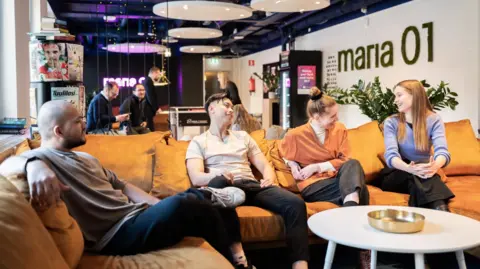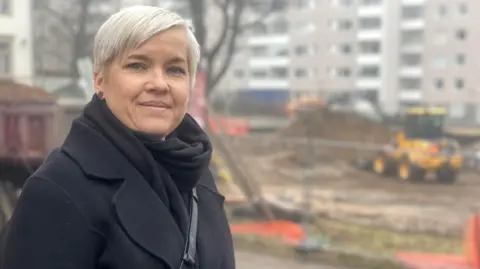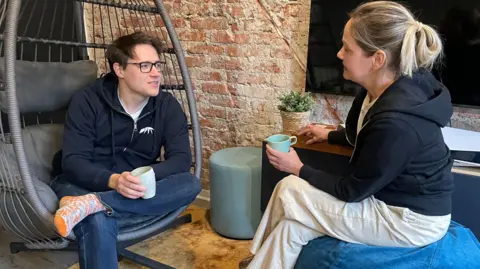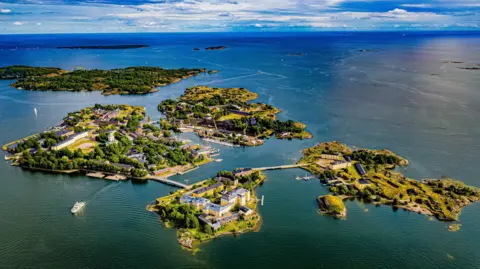BBC News, Helsinki
 Maria 01
Maria 01Yellow diggers are shoring up mounds of earth, as construction workers prepare to lay the foundations for what’s set to become the largest start-up campus in Europe.
The project is an expansion of Maria 01, a co-working and event space for entrepreneurs and investors, as well as larger corporations that want to collaborate with tech start-ups.
Its existing facilities across the street already house around 240 start-ups. They are spread across six buildings that used to make up the city’s first hospital, founded in the 19th Century and notorious in Helsinki for treating patients with the plague.
Now, the current 20,000 sq m site is a hub for companies developing innovative health technologies, alongside AI, cybersecurity, gaming and defence tech start-ups.
“The whole place is really based on community,” says Maria 01’s CEO Sarita Runeberg. “We bring people together so they can network… and find different kinds of resources to grow their businesses.”
There are also office perks including a pool table, table football, running and ice bathing clubs, and in true Finnish-style, a sauna.
“We wouldn’t be a proper start-up hub if we didn’t have our own sauna here!” laughs Ms Runeberg.
 Maddy Savage
Maddy SavageWhile co-working spaces for tech companies are well established across the Nordics, Maria 01 is the largest of its kind in the region.
It is run as a not-for-profit organisation partly funded by the city of Helsinki, which has invested more than €6m ($6.7m; £5.2m) in the hub since its launch in 2016.
Ms Runeberg believes it will become the biggest start-up campus in Europe following the completion of three new buildings by 2028, adding a 50,000 sqm floor area.
Later this year it is launching an accelerator programme designed to support and guide high-growth start-ups.
The hub’s current and former members have already collectively raised over €1bn in funding.
This represents around 40% of all early stage funding raised annually by Finnish start-ups.
Ruben Byron is the Belgian co-founder of a start-up offering cloud services to AI developers.
He has already scaled his business from a handful of staff using the hub’s hot desks to a team of around 40 working from private offices in the former hospital, as well as remotely.
“That has been a great experience, that we’ve kind of been able [to] be nurtured here in a way,” he says.
 Maddy Savage
Maddy SavageAlthough not as mature – or well known globally – as other European start-up hubs like Sweden and the UK, Finland has been steadily making a name for itself in the tech scene over the last two decades.
The small Nordic nation, which has a population of around 5.6 million, has spawned 12 unicorn businesses – firms worth a billion dollars or more – including sleep and fitness tracking ring Oura, game developers Supercell, Rovio (the creators of the Angry Birds game), and food delivery platform Wolt.
Last year, Startup Blink, a global index mapping more than 100 countries ranked Finland’s start-up ecosystem the 7th best in western Europe, and 14th in the world.
The index cites factors including hubs like Maria 01, alongside high levels of state and university support, and Slush – a huge annual non-profit gathering for global start-ups and investors.
It also highlights Finland’s transparent and open business culture.
“There is an authenticity with the Finns,” says Jack Parker, a Helsinki-based founder originally from Newcastle upon Tyne, who runs a healthcare innovation start-up.
“Ego doesn’t really play a part. So if I reach out to somebody, it’s quite likely eight out of 10 times that they will respond.”
 Maddy Savage
Maddy SavageFinland’s right-wing coalition, which came into power in 2023, is on a mission to push the country even further up global indices, stating in its official government programme that it wants the Nordic nation to become a leader in fostering a dynamic start-up and growth company ecosystem.
“It’s not just about rankings,” says Marjo Ilmari, who runs the start-up services team at Business Finland, the government agency that promotes investment and innovation.
In 2024 Business Finland alone invested €112m in start-ups, an increase of 30% compared to the previous year.
“The real goal is to create an environment where our ground-breaking start-ups can emerge and really tackle global challenges.”
The agency hopes this will help drive growth in the Finnish economy, which went into recession in 2023 and is currently making a sluggish recovery, with the Bank of Finland forecasting an increase of less than 1% this year.
The country is also trying to attract more global talent by offering start-up permits for international founders who want to grow their businesses in Finland.
These entrepreneurs are eligible for a so-called soft-landing support package provided by Business Finland.
“They give you advice, support, sometimes grants to support the initiation phase,” explains Lalin Keyvan, a Turkish-born entrepreneur at Maria 01 who says the scheme was one of the main reasons why she relocated to Helsinki.
Business Finland’s marketing campaigns for would-be movers highlight social and lifestyle factors too: Finns tend to prioritise wellbeing, plus there’s free education and subsidised healthcare and childcare.
“You don’t really have to choose between building a high-growth company and enjoying life, because you can do both,” says Ms Ilmari.
 Getty Images
Getty ImagesBut whether all this is enough for Finland to compete with Europe’s more established start-up hubs is up for debate.
Data suggests it still has a long way to go to catch up with neighbouring Sweden, long the Nordic darling of the European start-up scene.
It is home to more than 40 unicorn businesses including Spotify, payments platform Klarna and game developer King.
In Startup Blink’s ecosystem ranking Sweden ranks second in Europe after the UK, and top in the EU.
In the last decade it has attracted more than $29bn in funding compared to just over $8bn in Finland, according to the annual State of European Tech report by investment company Atomico.
“I love Finland’s bold approach,” says Charlotte Ekelund, CEO of Sting, a non-profit organisation that helps develop start-ups in Stockholm. However she believes Finland is still years behind Sweden in terms of pulling in capital and developing its ecosystem.
“We observe some of the things that the Finnish ecosystem is doing now, Sting was part of driving 10 or 15 years ago here – co-working spaces, [and] new organisations in the ecosystem that can support in different ways.”
Mikael Pentikainen, CEO of the Federation of Finnish Enterprises, says the country’s government is currently losing support amongst entrepreneurs despite its pro-start-up and pro-business approach.
A recent survey for the organisation found 41% of small and medium-sized business owners are satisfied with the coalition’s actions, down from 54% in June.
One likely reason for the dip, says Mr Pentikainen, is a decision to raise VAT from 24% to 25.5% last September, the highest rate in western Europe. The government said this was a “difficult but necessary” move designed to stabilise public finances.
But Mr Pentikainen suggests it could make Finland’s start-up ecosystem less competitive for international founders.
The Finnish government has also recently toughened up citizenship requirements, meaning foreign entrepreneurs now need to stay at least eight years instead of five in order to obtain a passport, and will soon also be required to pass a test on Finnish society and culture if they want to settle long-term.
Back at Maria 01, Mr Parker, the health company founder, says he’s confident Finland’s start-up ecosystem will continue to expand and attract international talent. But he warns it might lose some of the aspects that have so far made it an attractive option for entrepreneurs.
“The advantage of the ecosystem right now is this kind of ‘small town, everybody knows each other’ [feeling]. Scaling that up, there is the risk of actually losing that element of it.”





